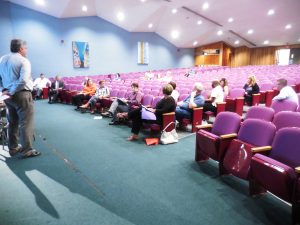WESTFIELD – The School Committee’s Educational Planning and Technology sub-committee held a public hearing on Tuesday on its new technology plan and “Bring Your Own Device” (BYOD) policy proposal. Sub-committee chair Ramon Diaz, Jr. thanked the members of the technology committee for their hard work on the plan, before turning the meeting over to Ronald R. Rix, the district’s Chief Financial Officer.
Rix began by saying the technology plan has been approved by the School Committee, but the district wanted to bring the BYOD policy to the public first. He said he expected the auditorium to be filled for the hearing, but only a couple of dozen faculty members and parents attended the presentation.
Rix also acknowledged the work of the staff at the Westfield Technology Center, who he said provides support and infrastructure for the district.
Starting with an overview of the plan, Rix said that the core revolves around academics, and is moving towards the BYOD policy, which he said will allow students to “bring and use what they use in real life.” He said the district’s vision is to embed digital learning and technology into the learning experience and management practices, to produce a technologically rich environment for diverse learners.
The plan has four main goals. For educators, the district will implement a data collection system that will ensure the effective use of data to drive the decision making process. In the past, the district has talked about the enormous amount of data collected through testing, for example, with the challenge being how to effectively use the data to improve the learning experience.
The second goal will be an academic program in which digital learning is fully integrated. Teachers will obtain adequate knowledge and skills to design high-tech lessons across all content areas through targeted and continual professional development.
The third goal is for WPS to provide equitable technological capabilities across the district, giving all students access to emerging technologies, educational programs, and effective interventions appropriate to their grade levels.
The fourth goal is a fiscal plan to phase in, roll out, and sustain the technology goals. Rix said in the last two years, the district has invested in 1,500 to 2,000 Chrome books in a move to mobile learning. He said they have had universal WiFi for a couple of years, but are expanding the density to be able to support 25 students on devices in a classroom.
The portions of the plan being implemented this school year include transitioning from an Acceptable Use Policy (AUP) to a Responsible Use Policy (RUP) for devices. Rix explained that the focus will move from “don’t, don’t, don’t, to here’s what we want you to do.”
The district also plans to create Google classrooms with Google accounts for all students, with varying degrees of accessibility. Teachers will have a folder for each student, which only that student will be able to access. K-4 students will have access to teachers, middle school students will be able to email teachers and other students, and by high school, the system will be open, and students will be able to access gmail at home. All internet traffic will be logged by the schools, and all gmail accounts monitored.
The BYOD program, following approval, will be implemented in the high schools beginning mid-year, and expand to the middle schools next year. In the third year of the plan, the BYOD may expand to elementary schools as well. Rix said they are talking to vendors right now, and will have products available for purchase and lease that are fully equipped. They will also provide devices for families that cannot afford them.
“For the first time, we’re giving the families a lot of choices,” Rix said.
Rix said the district has to comply with the Child Internet Protection Act (CIPA), and all devices in the schools, including BYOD will go through the school’s secured and filtered WiFi network. Devices will be used for educational purposes only, with strict rules on their usage, such as no photos or videos except with permission from the teacher. Bypassing the school’s network will be prohibited. Rix said that cellphones with 3G/4G technology would present the most problems in this case. The complete policy is available on the district’s website at www.schoolsofwestfield.org.
The district will also assess the staff’s digital knowledge and skills, and provide personalized development, “to bring staff where we want them to be.”
“I like your emphasis on professional development, which was lacking in the past,” said Steve Zawada of the Tech Center during the discussion. “If teachers don’t know how to use the stuff, they won’t know how to teach the kids,” he added.
“Some people are already experts, while some have just mastered email,” said WPS Superintendent Stefan Czaporowski said. He said they will be seeking grant funding for teacher training, and plan to have technology coaches in all the schools in the coming years.
School and technology committee member Kevin Sullivan said the district is no longer looking for a multi-million dollar bond for technology, but to find a dedicated source of income to fund it. Czaporowski added that they built in the funding to buy technology in this year’s budget.
Rix said the schools will be prepared for state-mandated online MCAS testing for all grades in the spring of 2019. “It’s an exciting thing, a little past due, but exciting,” he said.


